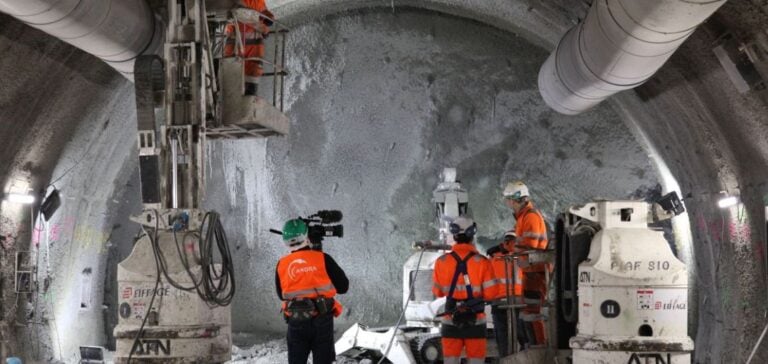The Institut de Radioprotection et de Sûreté Nucléaire (IRSN) recently published a report highlighting several “uncertainties” concerning the dimensioning of the Cigéo project, designed to bury radioactive waste. These uncertainties are mainly related to waste conditioning and storage methods.
The Cigéo project, located at Bure in the Meuse region, aims to bury France’s most radioactive nuclear waste 500 meters underground. The authorization application, submitted in early 2023, is currently being examined by the French Nuclear Safety Authority (ASN), which will soon be merged with IRSN. This process could take several more years before authorization is granted.
Impact of the Nuclear Recovery Program
TheIRSN report also looks at the impact of the nuclear revival program announced by Emmanuel Macron for 2022. This program calls for the construction of six new-generation reactors, with an option for a further eight. IRSN states that there are no objections to extending the operating life of current reactors to 60 years and commissioning the six EPR2s.
However, IRSN notes that the storage area could extend beyond the current limits of the zone d’implantation des ouvrages souterrains (ZIOS) by a few hundred meters to a few kilometers, while remaining within the transposition zone where the feasibility of storage was demonstrated in 2005.
New Studies Needed for Future Reactors
Questions remain about Cigéo’s capacity to manage the additional waste arising from the construction of the eight additional EPR2s or small reactors (SMRs) envisaged by the French government. In this case, IRSN stresses the need for further studies to assess the site’s suitability for this future waste.
At the same time, IRSN is making two technical recommendations: geological reconnaissance in a specific area of the project, and more precise well-digging methods.
Perspectives and Technical Recommendations
These recommendations underline the importance of a thorough geological understanding to guarantee the safety and viability of the Cigéo project. IRSN also proposes clarification of excavation techniques to avoid any potential risks during the development and operation phases.
The safety experts still have two more reports to submit to complete the appraisal of the Cigéo authorization application. Although controversial, this project is crucial to the management of radioactive waste in France, especially in view of the planned expansion of the nuclear fleet.
For industry professionals, these uncertainties and technical recommendations represent major challenges, but also opportunities for improving the safety and efficiency of nuclear waste disposal.
The IRSN report highlights crucial uncertainties about the Cigéo project, underlining the need for further studies to ensure its ability to manage future nuclear waste. This technical analysis and the associated recommendations will provide a sound basis for future decisions concerning France’s nuclear power plants.






















